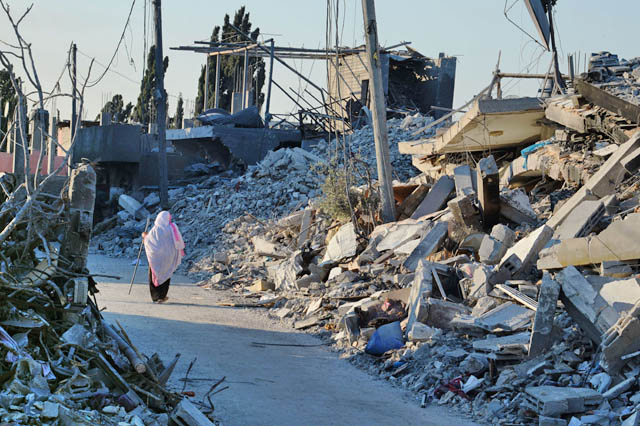GAZA/CAIRO — The threat of renewed war in Gaza loomed on Wednesday as the clock ticked towards the end of a three-day ceasefire with no sign of a breakthrough in indirect talks in Cairo between the Israelis and the Palestinians.
A Palestinian official with knowledge of the negotiations said Egypt had presented a new proposal for a permanent truce agreement that addressed a major Palestinian demand for a lifting of the Israeli and Egyptian blockades of the Gaza Strip.
Israel and Egypt harbour deep security concerns about Hamas, the dominant Islamist group in the small, Mediterranean coastal enclave, complicating any deal on easing border restrictions.
It was unclear from the official's remarks how those worries, along with Israel's demand for Gaza's demilitarisation, would be dealt with. Hamas spokesperson Sami Abu Zuhri said disarming was not an option.
The truce in the month-old hostilities — which have killed 1,945 Palestinians in the Gaza Strip and 67 on the Israeli side — was due to expire at 2100 GMT on Wednesday.
Gaza was still a dangerous place, even with the guns silent.
An Italian journalist, his translator, three Palestinian bomb disposal workers and one other person died on Wednesday when unexploded munitions blew up in the north of the enclave as attempts were being made to defuse the ordnance, officials said.
Simone Camilli, 35, a video journalist working for The Associated Press, was the first international journalist killed in the latest Gaza conflict. Palestinians say more than 10 local media workers have also died in the fighting.
US President Barack Obama spoke by telephone with Israeli Prime Minister Benjamin Netanyahu about the ceasefire efforts, the White House said, giving no immediate details of the call.
As the deadline neared, Israel also moved forces closer to Gaza and called up additional reservist troops, Israeli media reports said. The Israeli military said its “forces are moved around on a routine basis” and would not elaborate.
Azzam Ahmed, an official of the Fateh Party who heads the Palestinian team in Cairo, said the negotiations were at a very sensitive stage and it hoped to reach a ceasefire accord before the current truce expired.
“The issue is complicated and it is as if we have gone back to square one,” with each side sticking fast to its positions, a source with knowledge of the talks told Reuters in Cairo.
The source confirmed Israeli and Palestinian reports that Egypt may seek another 72-hour truce, in the event the sides could not agree on a wider deal by deadline.
Hamas leader Ismail Haniyeh told Al Aqsa Hamas television the group would insist on “lifting the Gaza blockade” and reducing movement restrictions on the territory’s 1.8 million residents, as a prerequisite to achieving a “permanent calm”.
Egyptian and Palestinian sources said Israel had tentatively agreed to allow some supplies into the Gaza Strip and relax curbs on the cross-border movement of people and goods, subject to certain conditions. They did not elaborate, and in Israel, officials remained silent on the state of the talks.
A Palestinian demand for a Gaza seaport and reconstruction of an airport destroyed in previous conflicts with Israel has also been a stumbling block, with Israel citing security reasons for opposing their operation.
The Palestinian official said Egypt had proposed that a discussion of that issue be delayed for a month after the long-term ceasefire deal takes hold.
As part of the Egyptian blueprint, Israel would expand fishing limits it imposes on Gaza fishermen to 10km.
“It will increase gradually to no less than 12 miles [around 19km] in coordination between the Palestinian Authority and Israel,” the official said, referring to a likely expanded role in Gaza affairs for the government of President Mahmoud Abbas, based in areas of the West Bank not occupied by Israel.
In addition, the official said, the Egyptian plan calls for reducing the size of a “no-go” area for Palestinians on the Gaza side of the border from 300 metres to 100 metres so that local farmers can recover plots lost to security crackdowns.
Since Israel launched its war on Gaza, most of the Palestinian dead have been civilians, hospital officials in the small, densely populated enclave say.
The heavy losses among civilians and the destruction of thousands of homes in Gaza, where the United Nations said 425,000 of 1.8 million population have been displaced by the war, have stoked international alarm.
